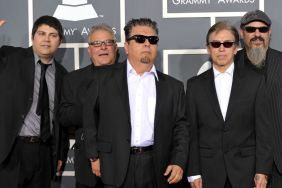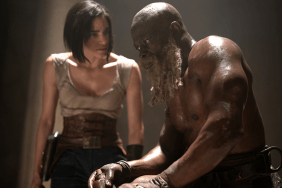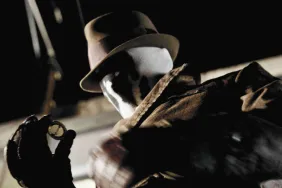At this point, it’s far too easy and obvious to make the joke about what a “long road” it’s been for John Hillcoat’s adaptation of Cormac McCarthy’s post-apocalyptic novel The Road to finally arrive in theaters. As both the eager and dubious fan of McCarthy’s novel will learn next week, it’s been worth the wait.
How the Australian filmmaker behind Nick Cave’s The Proposition got involved in trying to adapt McCarthy’s difficult work even before it was published is almost as fascinating a story as McCarthy’s tale of a father (Viggo Mortensen) trying to survive and protect his young son (newcomer Kodi Smit-Mcphee) in a world that’s been turned into a barren wasteland after an apocalyptic event. As the man desperately tries to find food for his son and himself, they’re also having to hide from the world’s roving bands of cannibalistic militia men who thrive on the mentality of eat or be eaten.
The resulting film is nothing short of amazing, not only for the spectacular visuals and locations Hillcoat found and created as the bleak canvas for the film, but also the intense drama that permeates every scene. As much as it puts a lot of weight on the shoulders of Viggo and young Kodi, they also have a number of strong supporting players in Robert Duvall, Charlize Theron and Guy Pearce. As difficult as it must be to be a father in the world we live in today, The Road successfully conveys the strongest feelings and emotions about how much harder it might be. It’s a powerful and unforgettable experience that’s likely to leave you shaken up and moved and even questioning what you might do if ever put into such situations. (It also reunites Hillcoat with Nick Cave and his musical collaborator Warren Ellis, who once again compose a suitably gorgeous score.)
ComingSoon.net sat down with Hillcoat a few weeks ago to talk about the movie that’s been well worth the wait.
ComingSoon: I know this got delayed for nearly a year, but did you finish it a while ago and it’s just been done?
John Hillcoat: Yeah, we knew that we had to release this… well, not had to, but the right time was to release it… I mean, there’s no better day than Thanksgiving because that’s what the film’s really all about… not eating turkey, but being grateful for things that we take for granted, rather than a summer movie.
CS: Did you actually finish all the post-production a while ago?
Hillcoat: Yeah, we’ve had long hiatuses. I mean, last year’s release date was always impossible. I always said it was impossible and when they saw the incomplete film they realized, “Hey, we can’t release this.”
CS: How did you first get involved with it? Had someone already been developing it?
Hillcoat: No, no, from the get go I got the manuscript before it was published. Nick Wechsler got me that, he’s a producer in L.A. We then discussed writers and this writer I always wanted to work with, Joe Penhall, I got him on board, then we got the script, then (the book) got published and went on to do all that it did.
CS: What was the time frame on that? Had you already finished “The Proposition” or were you still in the middle of it?
Hillcoat: No, no, I’d done “The Proposition.” “The Proposition” was actually very influenced by “Blood Meridian” that indirectly, even though it weirdly circles, I actually tried to get the rights to “Blood Meridian” and couldn’t and made “The Proposition” instead and that helped get “The Road,” because we showed that to Cormac’s people and Cormac saw it and really liked it, and saw the influences and helped push that on through.
CS: I was wondering how much time you had with Cormac through the whole process.
Hillcoat: None until we were in pre-production and that was right from the first conversation, he was absolutely brilliant, because he released a huge burden and weight from my shoulders, where he immediately just said, “Look, I understand a book’s a book, a film’s a film, totally different mediums and away you go.”

CS: Had he already gone through the process with the Coen Brothers’ movie “No Country for Old Men” at that point?
Hillcoat: Oh yeah, yeah. But he’s been involved in film. He actually wrote “No Country” as a screenplay and no one would make it, another irony, and then put it off and turned it into a novel and it did its thing. It’s kind of weird, these things. He really understands film, the medium, very well and he can see the differences and understand the differences and is very interested in both mediums, but of course, literature is his thing. But he’s very visual, like the images that he conjures up, I mean, it’s very filmic. I know some people think, “Oh, he’s unfilmable,” but I think quite the opposite. As you can see from “No Country” and “The Road,” it’s meaty film material, a lot of meat to sink your teeth into, but very different films by the way. He never asked to read the script, never volunteered and had endless conversations, came to set with his son who called him “Papa” and then were finally showed it to him at an earlier stage.
CS: Were most of the visual influences taken from the book or did you have other things you wanted to bring into it?
Hillcoat: We kind of went off on a slight tangent, but it was all inspired from the book, like the fact that he’s pushing all his possessions in a shopping trolley led us to the homeless. That defined the wardrobe. My production designer and I–our references weren’t other films–we had actual photos of locations that were like a small apocalypse in themselves. The world felt familiar in some way even though it’s so extreme. I think there’s that and the other slight digression was the flashbacks. We wanted to make a little more of the flashbacks and make the wife a little more empathetic in terms of understanding her position and her choice.
CS: Were those flashback scenes shot very early on or much later in the shoot?
Hillcoat: We started in the winter and then we went to Oregon and actually some of it was shot in New Orleans when they were doing their post-Katrina cleanup. It’s still going on.
CS: Some of the scenes with the boats, that was shot down there?
Hillcoat: Yeah, yeah. Actually the boats, it’s literally sourced from a 70mm IMAX shoot. That shot was filmed two days after Katrina hit. What we did then was get the CGI to put in… because there was a blue sky and bright sun and green grass so we replaced all that, but the actual boats and all the debris, it’s all real.
CS: I was really curious about the locations. I didn’t realize how much you actually shot in the United States. I saw the movie and assumed it was Eastern Europe or Canada or even Australia, because we’re so used to seeing other places doubling as America.
Hillcoat: America’s such a big country, but it’s also got every terrain there is and really rich locations. I think it’s really important that there are these tax incentives, because that is bringing the work back. I mean, I’ve always felt it was a shame that films about America are being shot in Canada and Australia. It’s good for those industries, but it’s kind of a bit crazy to drive the work when the stories are about (America) and also given how rich the locations are. I’ve traveled all over America throughout my life and it’s just unbelievable what’s out there.
CS: Did you do a lot of location scouting where you took photos and then played with them in your computer to find out what would be possible?
Hillcoat: Yeah, yes, essentially.
CS: Getting Viggo on board, I always assumed he was a very creative and collaborators actor. He’s not one of those guys who just comes in, does his lines and goes back to the trailer. I mean, was he very involved?
Hillcoat: Well, very involved in that it’s 110 percent, from the day he shows up. He’s very intense. He’s very Method. There’s no stopping him. He was starving himself. He was going out, rolling in the snow and sleeping in his wardrobe and rubbing the dirt in his eyes and face, I mean, it’s extraordinary. It makes the performance all that more incredible. But I think also he’s got an incredible face, a very expressive face. To find an everyman that you could buy going through that, because he’s a very physical actor as well. It was a hell of a thing for him to undertake, because there’s nowhere to hide. He’s in every single frame almost, throughout every scene, and every emotion he has to delve into, every emotion. The journey is very extreme, so it’s a lot to ask of someone.

CS: Was he at all involved in the process of finding Kodi to play his son?
Hillcoat: Well, no and yes in that we had more conversations, Viggo and I, about (it) and that we shared our greatest fear together in making this entire film was the kid. It doesn’t matter how great everything is and with the rest of this fantastic cast, with Duvall and Charlize, it falls over if the kid…
CS: Right, if he can’t do it.
Hillcoat: So I cast a wide web over America, Canada, Britain and very late in the day I was tipped off about this kid in Australia actually.
CS: Oh, he’s Australian? I didn’t know that.
Hillcoat: Yeah, he just did one film there. I saw the trailer, I got him to audition, put him on tape. His father’s an actor, he’s one of the cannibals in the film. His sister’s an actor. They did scenes that I would never have asked any kid to audition and his real father was playing the father in the audition. I knew either they were insane and I’d bring in child services, or it’s a message, and that proved to be the case is, “My kid could handle this.” So he was part of the short list of four actors and then worked with Viggo to see how they worked together. I actually saved Kodi for last, because I had a suspicion he was going to be the one and it was just amazing, the two of them.
CS: I’m sure you get asked this a lot, the movie is so grim and dark and it needs to be…
Hillcoat: And beautiful and hopeful… and emotional.
CS: True, but people tend to the focus on the negative unfortunately.
Hillcoat: That’s a bit frustrating because it’s like focusing on the backdrop or the background scenery, but anyway…
CS: But some people like that about the movie. The question is what was it like on set, especially because you were trying to shoot in the worst weather you possibly could?
Hillcoat: That was very taxing. There was a lot of black humor as well and the locals thought it was hilarious seeing us work, because if it was a sunny day, we’d have our Spanish DP swearing at the sky in Spanish, cursing the sky on a beautiful sunny day in the winter in Pennsylvania, whereas if it was bleak as hell and raining sideways we would all have this really our spirits would be raised and we would just be diving in. But for the actors it was I think–and I think they agree–that it was like a character that they reacted off of. But yeah, I mean, there was an extraordinary moment actually with Michael K. Williams–this is the sort of things that went on–but he was doing this incredible performance, heart-rendering, of pulling off his clothes and then he started doing these weird movements, and then he started to break out into song and dance. I was like… just so thrown, but it was that kind of humor that was going on all the time and we were also trying to allow Kodi every chance we could to be a kid again.
CS: There was a lot of traveling I assume.
Hillcoat: Yeah, there were 50 different locations. 80 percent was exterior in the winter and we went to four different states.
CS: How about getting someone like Robert Duvall to be in the movie? Was it just a matter of getting him for one or two days?
Hillcoat: Yeah, a couple of days, that’s it. They were just phenomenal, Guy Pearce, and the Duvall thing, he was sitting out there. He wasn’t in his trailer all day. He was sitting in the freezing cold while we were even setting up shots. He was just sitting in his own space. There was a real poignancy working in a place like New Orleans where half your crew had been through Katrina and just working with the elements like that, even for the crew it was tough, but it was also exciting because we were seeing the world in camera as opposed to imagining it in green screen.
CS: Do you feel like the movie coming out a year later might have been better for it because of the times?
Hillcoat: It’s even more apocalyptic.

CS: Everyone’s so down on everything because of the climate but then you see a movie like this and you realize it could be even worse, in some ways… or it could be better, because even in this condition, there’s still hope.
Hillcoat: Yeah, I think it’s very timely, but there was also a lot of negative expectations. People are very protective of the book understandably, but there’s a lot of irrational stuff going on with this and negative expectation because of the build-up and not releasing last year, people assumed that it was in trouble, all the rest. So their darkest fears were projected onto it and that was tough to break through.
CS: I wanted to ask if it was daunting taking on the adaptation of such a popular book, but you were actually involved before the book became popular.
Hillcoat: Yeah, but it was still daunting because Cormac was still a legacy at that point. He’d done “Blood Meridian” and the “Border Trilogy.” But, yeah, he hadn’t burst out into the public the way he did, that’s true, but I try not to focus on any of that while it was piling it onto my shoulders, as my back was bending and I was collapsing into the floor from the weight.
CS: I wanted to ask about the animal sounds at the end credits. They have no music, just animal sounds at the end.
Hillcoat: Yeah, and people just chatting in the background. It’s just like everyday life basically as a reminder of Thanksgiving and things we take for granted. That’s the idea, to bring it back full circle in how it began. Those sounds are from the beginning of the film.
CS: I also wanted to ask about the next thing you are doing, because I know this has been done for a while. Have you started working on something else with Nick Cave?
Hillcoat: Yeah, Nick’s written a new screenplay for me based on a book. It’s a genre film, amazing cast, and hopefully, touch wood… it’s called “The Wettest County.”
CS: So you’re casting? Will you be shooting pretty soon?
Hillcoat: Oh yeah, February.
CS: Do you think that will be a less daunting endeavor than this one?
Hillcoat: Well, I mean, I love genres, but I love finding new ways of telling (those stories), finding a new angle and it’s a gangster film. Yeah, it’s a world in that world that I don’t think we’ve seen before, so I guess that’s always daunting. Yeah, but I’m always trying to do it. Yeah, it’s like this. This is such an original approach from the book to the apocalypse. It’s actually putting the whole big event and spectacle, which is normally the sole focus, and putting the spotlight straight onto everyday as father and son and a very intimate relationship. “The Proposition,” I tried to do an American Western but ended up going to discover the frontier of Australia which has its own Western element. So I’m trying to always find new worlds within the old worlds.
CS: I’ve had a couple arguments with people about whether this movie should be considered genre or not, because there are horror and sci-fi elements.
Hillcoat: Well, look, like “Alien” was a sci-fi, but it tapped into horror. There’s movement within genres, but I do think because the word “apocalypse” comes up so often, it is a subgenre of science fiction, but there’s a lot more to it than that. But I think actually the best genre films always are, they always have other levels.
CS: Right, like Duncan Jones’ “Moon” for instance.
Hillcoat: Oh yeah, which I’m REALLY keen to see. That’s sort of indirectly how this came about in the sense that I was talking to Nick Wechsler about sci-fi and it’s a genre that I’d like to explore. This is going back, right after “The Proposition” and I was saying, “But what frustrates me is it’s all so clever and high concept, sci-fi, that it’s like this minefield of clever ideas and there’s no real human connection anymore.” I’ve missed those. That’s what I loved about “2001” and “Alien.” Then when I heard about “Moon,” it’s like, “Ah, that’s exactly it.”
The Road opens in select cities on Wednesday, November 25, and will go wider in December.









